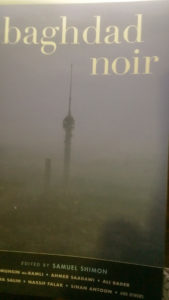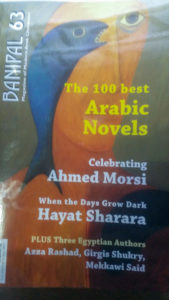Baghdad Noir (Akashic Books) contains fourteen new short stories penned by an impressive line-up of primarily Iraqi writers. Each story is set in a different part of Baghdad. The tales are a heterogenous bunch: in ‘I Killed Her Because I Loved Her’, a mother and her two daughters are working on different sides of the American forces v Insurgency divide, with tragic consequences. In ‘Doomsday Book’, a man is recruited to commit “divine, holy murder” until his distraught brother tracks down the recruiter. In ‘Baghdad on Borrowed Time’, a detective is hired by a killer with a bizarre proposition: the killer wants himself killed. In ‘The Apartment’, a sharp-eyed criminal investigator detects an old lady’s death was not by natural causes. In ‘Empty Bottles’, a young woman is murdered, her screams masked by the call to morning prayers, as an entire neighbourhood blocks its ears. In ‘Homecoming’ a father is attacked by an area thug, leaving his soldier son seething. In ‘Baghdad House’, an accountant lands in a hotel with deadly goings-on. The overall effect of this gathering of stories is kaleidoscopic: shifting fragments that, coming together in the collection, create a sense of Baghdad’s uneasily beating heart.
The stories are crisply edited. Most of the stories have been written in English. A few have been translated from Arabic, and where they have, the translations are smoothly done.
As a city, Baghdad presents a challenge for crime fiction. Arguably, the genre is predicated on a functioning state apparatus imposing law (however cankered), and handing down some form of justice, (however partial or temporary), against a backdrop of a society in some form of order (however warped). Given all these anchors – law, justice, order – appear to have been pulled up by the maelstroms Iraq has experienced, the genre has to react. The Baghdad Noir response is to explore what justice might mean to citizens living in such a shattered landscape, how individuals either reconcile themselves to these disjunctions or else attempt to reconstitute justice and its associated concepts.
The collection features a wide range of such troubled, burdened protagonists: nervous accountants, embittered relatives, laconic detectives, traumatised children and frightened students among them. There are touches of the phantasmagorical and the magical in the tales but, for the most part, the mode is realist, as if the absurdities of life in Baghdad need no extra gilding with fantasy….
(Full review is contained in Banipal Magazine, Edition 63 (The 100 Best Arabic Novels)




